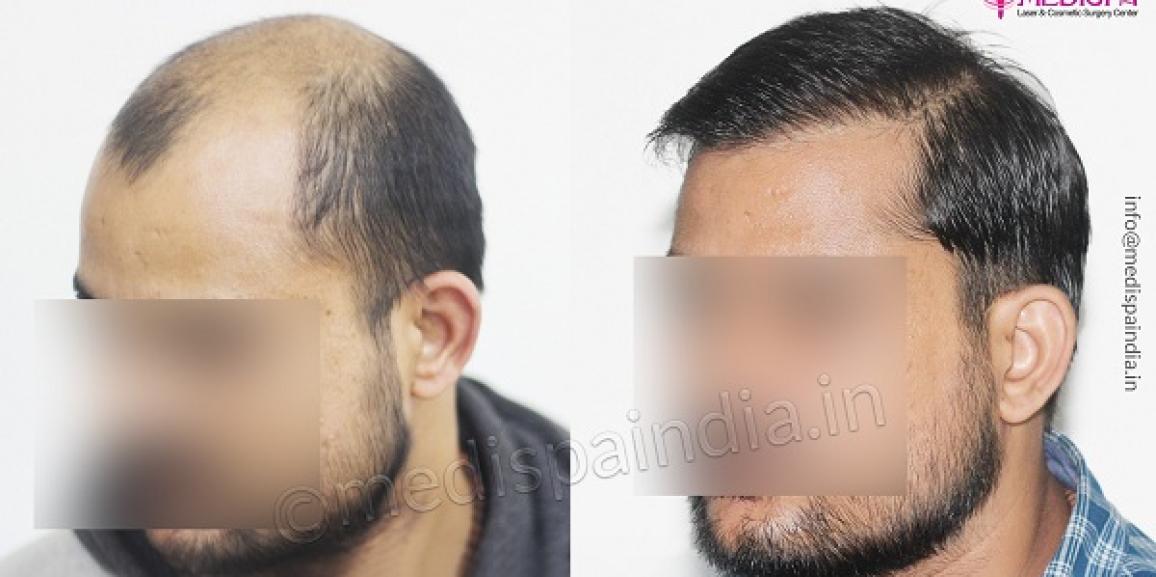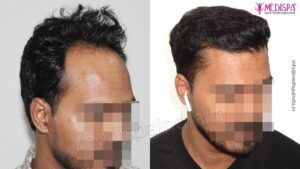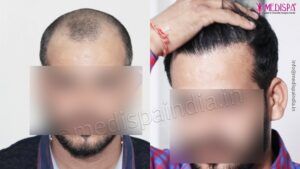
Hair loss can be caused by a variety of factors, the most frequent of which is hereditary hair loss, also known as pattern baldness or androgenic alopecia. Alopecia areata, a kind of hair loss associated with autoimmune, is one such example.
Hair transplant treatments have made it possible to attain the highest possible hair density in order to conceal baldness with a completely natural appearance. Hair transplant is an elective operation that may be performed on anybody suffering from hair loss, but because it is a surgical process, the conditions must be favourable to pursue the procedure.
To ensure that you are a good candidate for the surgery, you must have your case evaluated by a hair transplant surgeon. The consultation involves a comprehensive inspection of the scalp as well as a record of the patient’s medical history, which might validate the procedure’s viability.
In India, the hair transplant industry has grown enormously. Every year, it expands and broadens their horizons, particularly in metropolitan areas. The procedure’s growing popularity in India is the primary cause for its widespread adoption. Hair transplant tourism in India is increasingly a key priority for people from all over the world.
The reason for this might be due to the fact that there are only a few world-famous hair transplant surgeons, the greatest services and facilities, worldwide standards, and, to top it all, a reasonable cost of the treatment. People go from all over the world for hair transplant tourism since the cost is so low. Hair loss patients are drawn to India not just because of the low cost, but also because of the excellent standards that hair transplant facilities maintain.
Hair transplant in Jaipur, in particular, has carved out a unique niche in India. The pink city has gained in prominence in the hair transplant industry not just in the United States, but also internationally. The hair transplant cost in Jaipur is relatively low, and individuals from all over the country are drawn to the city because of the low cost and great quality.
What is alopecia areata?
Alopecia areata is an autoimmune disorder that occurs when the immune system misidentifies healthy cells as foreign invaders. Alopecia areata occurs when the body’s immune system assaults hair follicles, causing them to shrink and cease generating hair, resulting in hair loss.
It usually appears as little, inconspicuous patches of hair loss that join together to form a larger patch. Hair loss may occur anywhere on the body, including the scalp, eyebrows, eyelashes, and face, as well as other regions of the body. It might also take a long time to develop and return after a long period of time.
How it is caused?
Alopecia areata’s exact aetiology is yet unknown. However, genetics are thought to be to blame for the disease’s occurrence. If a person’s family has a history of autoimmune disorders such as Type 1 Diabetes or rheumatoid arthritis. Aside from genetics, there are also unknown environmental variables that contribute to its prevalence.
Alopecia areata in males:
Males are more likely to have it, and it affects their facial hair, as well as their scalp, chest, and back hair. It is easy to distinguish from male pattern baldness because male-pattern baldness causes progressive thinning of hair all throughout, whereas alopecia areata causes hair loss in patches.
Alopecia areata in females:
In females, it primarily affects the eyebrows and eyelashes, as well as the scalp. Similarly, female pattern baldness causes hair thinning over a vast region, but alopecia areata causes several tiny patches of hair loss.
How to manage alopecia areata?
Temporary hair loss management: Wearing a wig to cover up the baldness might be an option. Suction wigs are now available for youngsters to protect them from falling while playing.
Medical assistance:
- Topical application: Minoxidil, anthralin, and clobetasol are over-the-counter creams that are used to areas of hair loss to promote hair growth. However, there is no evidence of effectiveness in alopecia areata.
- Oral therapy: Immunosuppressive medications can be used to suppress autoimmunity, but they are not recommended for long-term usage owing to adverse effects.
- Injection: A steroid injection can help hair regrow, but it doesn’t prevent hair loss.
Surgical treatment: In appropriate circumstances, hair transplantation might be performed.
Possibility of Hair transplant in alopecia areata:
Hair transplantation is possible in alopecia areata patients who have been stable for at least two years. Hair transplantation can be conducted if patchy hair loss has not altered or increased for years and a scalp biopsy reveals no inflammation beneath the scalp. Although it has been proven to be beneficial in the majority of stable instances, the success rate varies from person to person. Hair transplantation is performed in the same way it is in other circumstances, depending on the location of baldness.
However, the patient must be informed of and accept the possibility that the transplanted hair will come out again. To avoid any unreasonable expectations, a detailed discussion with your hair transplant specialist is required in these circumstances.
Dr. Suneet Soni, the founder of Medispa centres in Delhi and Jaipur, is a pioneer in hair transplantation for alopecia areata patients and is one of our country’s most known hair transplant surgeons. Because further sittings may be necessary, his cautious technique of protecting hair follicles and minimising harm to follicular grafts might be a lifesaver for patients suffering from alopecia areata.
If you have any doubts, schedule an appointment with the Medispa hair transplant centre.







